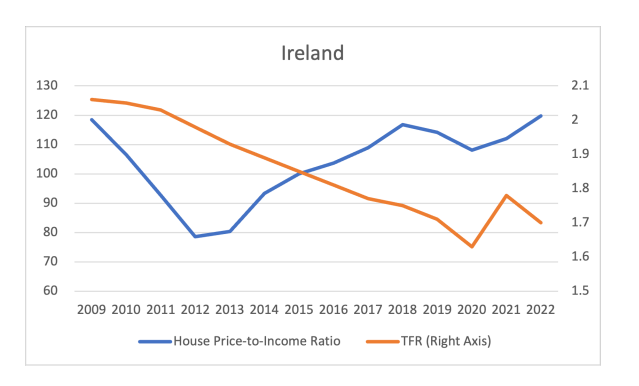While the cost of housing is frequently cited as a reason for delayed family formation and having children, the evidence does not strongly support this claim, according to a new study from the Policy Exchange think tank in the UK, which mentions Ireland, among other countries.
A brand new Amarach survey commissioned by Accord, the Catholic marriage care service, finds that “84pc of adults in Ireland say that the housing crisis is causing some couples to delay getting married and/or having children.” So the perceived link between the cost of housing and the delaying in settling down and starting a family is very strong.
Moreover, the same poll found that “48pc of couples planning to get married would have married sooner if it weren’t for the housing situation; and 60pc of couples planning to have children would have done so earlier if it weren’t for the housing situation”.
This perception seems logical, as housing is one of the most expensive elements of starting a new family. But is there concrete evidence to support what appears to be common sense?
The new Policy Exchange report, called ‘Small State or Small Families?’ contradicts the public sentiment. The research found that there is no positive correlation between housing affordability, measured in terms of price-to-income ratios, and fertility rates.
The above chart shows a steady decline in fertility rates in Ireland regardless of the price of housing. (Ignore the blip during the Covid pandemic which was an exceptional period). In simple terms, fertility rates did not increase when housing became more affordable.
House prices in Ireland fell very sharply between 2009 and 2012. Yet, despite this decline in prices, fertility rates kept falling and have not rebounded, even though Ireland’s economy began recovering in 2010 and unemployment levels improved by 2016. This suggests falling property prices alone does not necessarily lead to higher fertility/birth rates.
As the report itself says: “At the same time [as housing became more affordable], Ireland’s fertility rate fell – and it kept falling. It is hard to attribute this effect to the recession and austerity that Ireland experienced in this period. Ireland returned to growth in 2010 and by 2016, unemployment was at reasonable levels. Despite this, with much more affordable housing, fertility rates continued to fall.”
Beyond Ireland, the Policy Exchange study also considered Lithuania and found again no evidence of a correlation between fertility rates and housing affordability.
Indeed, across Europe, regardless of housing affordability, fertility rates are low and mostly falling.
This indicates something else is at work, and that is probably values, as our new paper argues. What do people prioritise? If, in your 20s, you value your freedom above all, and therefore avoid the major commitments involved in raising a family, then even if you can afford a home, you will delay having children anyway, and the longer you leave things into your 30s, the less likely you are to have children, or at least the number you had in mind. Hence our falling marriage and fertility rates and our rapidly ageing population.


















